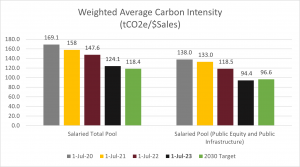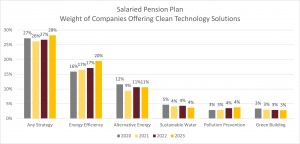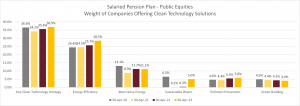Salaried Pension Pool
McMaster invests the salaried pension pool (the “Salaried Pool”) funds in investment manager products that are diversified across asset classes, investment styles, and geographies. The selection of investment manager products incorporates performance and environment, social, and governance (“ESG”) considerations associated with the United Nations 17 sustainable development goals. All of McMaster’s salaried pension pool investment managers are signatories to the UN Principles for Responsible Investment (“PRI”). All investment managers use an ESG-Integrated approach, aligned with the CFA Institute’s current guidance, as part of the product’s company selection process.

Salaried Pension Pool Managers
Investment managers are monitored quarterly by the Pension Trust Committee in accordance with the policies and procedures approved annually by the Board of Governors. With McMaster’s adoption of TCFD, a listing of investment managers is captured in each Pension Plan’s Annual Fund Financial Statement.
The Salaried Pool uses both pooled and segregated investment manager products. The pooled products often provide access to investments and products that would not be accessible directly using a segregated account. McMaster does not have any discretionary direction on pooled accounts over the companies selected by the Investment Manager. Investment Managers of pooled products are hired for alignment to the policy and assess each company added or removed from its product using its ESG-integrated approach reviewed and accepted by the Pension Trust Committee.
Segregated or discretionary funds can be directed by the Pension Trust Committee, however if investments/industry sectors are removed from a strategy the performance benchmark used to evaluate the investment manager may need to be changed at the same time.
The current investment managers and products used are listed below with links to the company’s website for further information.
Information Box Group
Real Estate
| MANAGERS | PRODUCT | POOLED OR SEGREGATED |
| Bentall Kennedy | Prime Canadian Property Fund | Pooled |
Fixed Income
| MANAGERS | PRODUCT | POOLED OR SEGREGATED |
| BlackRock | Blackrock Canada Universe Bond Index Class A | Pooled |
| Blackrock Canada Long Bond Index Class A | Pooled |
US Equities
| MANAGERS | PRODUCT | POOLED OR SEGREGATED |
| BlackRock | US Equity Alpha Tilts B | Pooled |
| T. Rowe Price | US Large Cap Core Growth Equity Pool | Pooled |
EAFE Equities
| MANAGERS | PRODUCT | POOLED OR SEGREGATED |
| GMO | International Developed Equity Allocation Fund | Pooled |
| Walter Scott | EAFE Equity | Pooled |
Infrastructure
| MANAGERS | PRODUCT | POOLED OR SEGREGATED |
| IFM Infrastructure | Global Infrastructure Fund | Pooled |
| Axium Infrastructure | Infrastructure N.A. Limited Partnership | Pooled |
Canadian Equities
| MANAGERS | PRODUCT | POOLED OR SEGREGATED |
| Jarislowsky Fraser | Canadian Equity | Segregated |
| State Street Global Advisors | Windwise Canadian Equity | Pooled |
Global Equities
| MANAGERS | PRODUCT | POOLED OR SEGREGATED |
| Mawer | Global Equity Fund Series 0 | Pooled |
| RBC Global Asset Management | Global Equity Focus Pension Trust | Pooled |
| State Street Global Advisors | Foreign Exchange Hedging Manager | Segregated |
Weighted Average Carbon Intensity
The weighted average carbon intensity measures the Salaried Pool’s exposure to potential carbon-intensive companies, expressed in tons greenhouse gas converted to carbon dioxide emissions using the greenhouse gas protocol per million sales, written as tCO2e/$Sales. This metric is recommended by TCFD after global consultations involving over 1,100 organizations.
The weighted average carbon intensity (“WACI”) for the Salaried Pool as at April 30, 2023 is 124.1tCO2e/$MSales based on 72.8% data availability, as measured by MSCI. The Salaried Pool’s WACI is 11.4% lower than the WACI measure for the All-Country World Index (ACWI) ex-Fossil Fuel Benchmark.
The weighted average carbon intensity of the Salaried Pool for the public equity is 94.4/tCO2e/$Sales based on 96.8% data availability. The Pool’s public equity WACI is 10.9% lower than the WACI measure for the ACWI ex-Fossil Fuel Benchmark.
Where data is not available, Scope 1 and 2 carbon emissions are estimated using MSCI’s proprietary carbon estimation model.
The Pension Trust Committee is aware of McMaster’s decarbonization strategy aligned with the United Nations Principles for Responsible Investment and began measuring carbon exposure in 2020 across all asset classes and investment manager products. In 2021/22, the Pension Trust Committee approved an initial carbon reduction target of 30% by 2030 based on its 2020 baseline using the weighted average carbon intensity measure (“WACI”). The initial target will be reviewed in 2024 following the completion of an updated asset/liability study and climate-risk-opportunity review. Since 2020, the Salaried Pool has reduced carbon exposure by 26.6% and within the public equity by 31.6%.
In addition to Investment Manager ESG-Integrated approaches to selecting companies within each product, McMaster uses further active engagement strategies through a University Network for Investor Engagement. McMaster monitors investment manager’s active stewardship through company engagements and proxy voting. The University supports investment manager divestment decisions where companies fail to set plans aligned to the Paris Agreement targets.

Source: MSCI Salaried Pension Plan Total Pool and MSCI Salaried Pension Plan Public Equity Reports: 2020, 2021, 2022, 2023
CLEAN TECHNOLOGY SOLUTIONS
The Salaried Pension Pool includes holdings that offer clean technology solutions. MSCI measures the weight of these solutions based on sales across the following categories: alternative energy, energy efficiency, green building, pollution prevention, and sustainable water. The Salaried Pension Pool weight of companies offering clean technology solutions is 28.2%, and across public equity holdings the weight is 36.9%.


Source: MSCI Salaried Pension Plan Total Pool and MSCI Salaried Pension Plan Public Equity Reports: 2020, 2021, 2022, 2023
FOSSIL FUEL RESERVES
The Salaried Pension Pool initiated a decarbonization target in 2020 aligned with the United Nations Principles for Responsible Investing. The Salaried Pension Pool tracks the weight of publicly traded holdings owning fossil fuel reserves and specific high impact fossil fuels such as coal, oil sands, shale oil and shale gas that are more exposed to stranded asset risk. Coal is by far the most intensive fuel emitting twice the emissions per kilowatt hour than natural gas. Stranded asset risk has focused on thermal coal, which is mainly used in power generation. While both thermal and metallurgical coal have a high carbon content, metallurgical, or coking coal is used in steel making and has few substitutes, so many investment managers believe thermal coal is more vulnerable to stranding whereas there will still be a future need for metallurgical coal since substitutes such as natural resources are insufficient in supply and durability.
The Salaried Pension Pool has a 3.3% weight of holdings owning high impact fossil fuel reserves representing a decrease from 2022, but an increase over the 2.1% 2020 baseline. The Pension Trust Committee will establish strategies to achieve its decarbonization target and monitor the impact those initiatives on this metric

Source: MSCI Salaried Pension Plan Public Equity Reports: 2020, 2021, 2022, 2023
